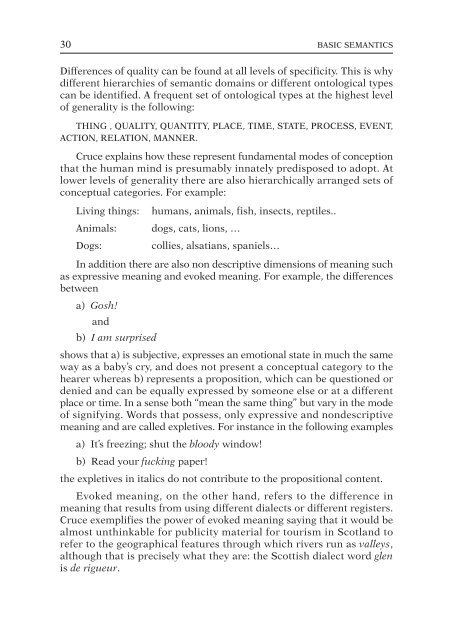Semantics
Create successful ePaper yourself
Turn your PDF publications into a flip-book with our unique Google optimized e-Paper software.
30 BASIC SEMANTICS<br />
Differences of quality can be found at all levels of specificity. This is why<br />
different hierarchies of semantic domains or different ontological types<br />
can be identified. A frequent set of ontological types at the highest level<br />
of generality is the following:<br />
THING , QUALITY, QUANTITY, PLACE, TIME, STATE, PROCESS, EVENT,<br />
ACTION, RELATION, MANNER.<br />
Cruce explains how these represent fundamental modes of conception<br />
that the human mind is presumably innately predisposed to adopt. At<br />
lower levels of generality there are also hierarchically arranged sets of<br />
conceptual categories. For example:<br />
Living things:<br />
Animals:<br />
Dogs:<br />
humans, animals, fish, insects, reptiles..<br />
dogs, cats, lions, …<br />
collies, alsatians, spaniels…<br />
In addition there are also non descriptive dimensions of meaning such<br />
as expressive meaning and evoked meaning. For example, the differences<br />
between<br />
a) Gosh!<br />
and<br />
b) I am surprised<br />
shows that a) is subjective, expresses an emotional state in much the same<br />
way as a baby’s cry, and does not present a conceptual category to the<br />
hearer whereas b) represents a proposition, which can be questioned or<br />
denied and can be equally expressed by someone else or at a different<br />
place or time. In a sense both “mean the same thing” but vary in the mode<br />
of signifying. Words that possess, only expressive and nondescriptive<br />
meaning and are called expletives. For instance in the following examples<br />
a) It’s freezing; shut the bloody window!<br />
b) Read your fucking paper!<br />
the expletives in italics do not contribute to the propositional content.<br />
Evoked meaning, on the other hand, refers to the difference in<br />
meaning that results from using different dialects or different registers.<br />
Cruce exemplifies the power of evoked meaning saying that it would be<br />
almost unthinkable for publicity material for tourism in Scotland to<br />
refer to the geographical features through which rivers run as valleys,<br />
although that is precisely what they are: the Scottish dialect word glen<br />
is de rigueur.



